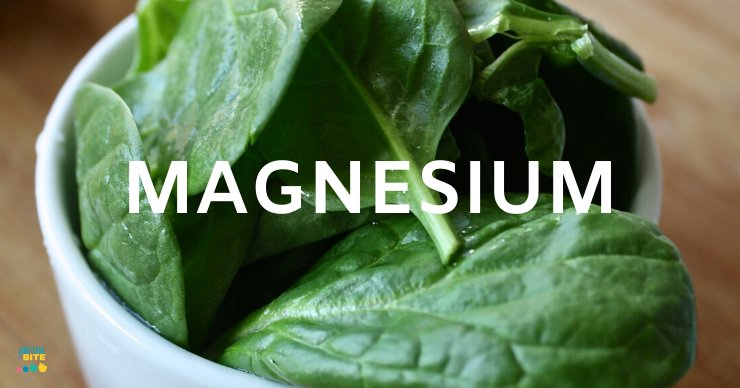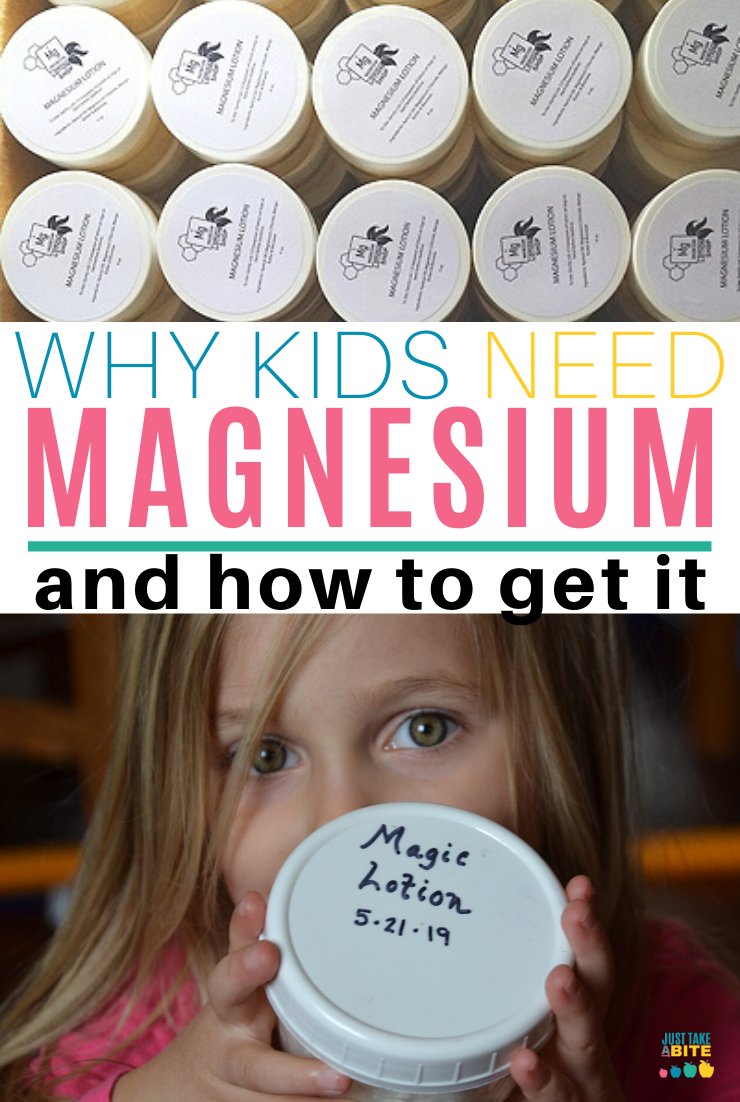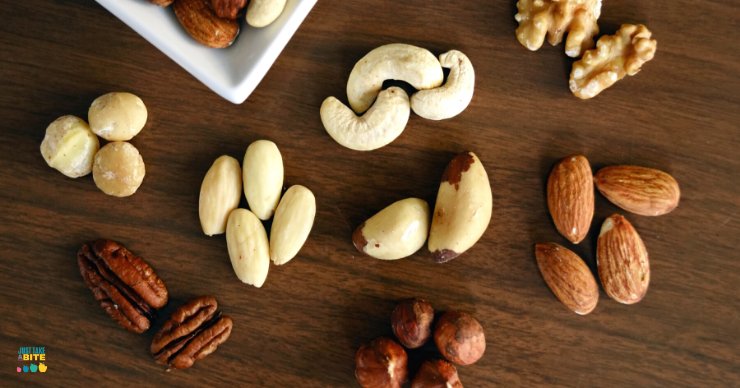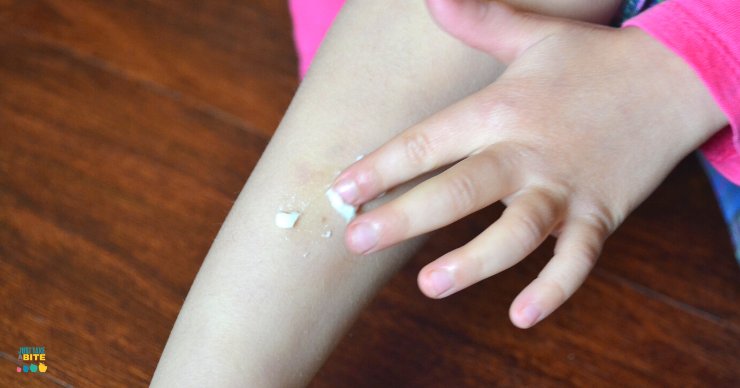In our world of degraded soil, processed foods, and toxic pesticides, almost every child is magnesium deficient. Today I’m going to tell you why that matters – why kids need magnesium and the best ways for them to get it.
Call my kids weird, but they were so excited to get their own jars of magnesium lotion as stocking-stuffers for Christmas. It might seem like an odd thing for a five-year-old to smile about. But she knows just how amazing magnesium is for her health.
I’m not even exaggerating that she put it on about ten times the first day she had it! And she wouldn’t let anyone else touch it. Around here, magnesium lotion is a prized possession.
Let’s find out why magnesium is so magnificent!
What Does Magnesium Do?
A better question might be, “What Doesn’t Magnesium Do?” Magnesium is an essential macromineral that is involved in several hundred enzymatic reactions in the body.
Considered the “anti-stress” mineral, magnesium is a natural tranquilizer. This can help with relaxing muscles, including both skeletal muscles and smooth muscles as in blood vessels and the digestive tract. Which is why sufficient magnesium intake helps with slow digestion.
Magnesium also plays a significant role in heart health, again relaxing muscles and preventing coronary artery spasms. It can also lower blood pressure and is sometimes used to treat pre-eclampsia in pregnancy.
If you struggle with recurring kidney stones, it is likely due to a magnesium deficiency. Magnesium helps prevent the calcification of tissues and blood vessels (including kidney stones, atherosclerosis, and even cavities!).
Magnesium plays a role in energy levels as well. Because it helps nutrients pass back and forth across cell membranes, magnesium helps in the release of energy. This may also lead to aiding with nervousness, anxiety, insomnia, depression, and muscle cramps.
Magnesium has been shown to impact blood sugar regulation, type 2 diabetes, ADHD, migraines, and Alzheimer’s too.
These are just a few of the many roles of magnesium in the body. As you can see, it is a very important mineral!
What are the Symptoms of Magnesium Deficiency?
So how do you know if you or your kids are magnesium deficient? These days if you don’t supplement you are likely deficient. It’s sad, but true. Here are some of the common symptoms of magnesium deficiency:
- fatigue
- anorexia
- irritability (tendency towards blood sugar dysregulation and acting “hangry”)
- insomnia (anybody have kids that struggle with sleep?)
- muscle twitching and cramping (restless legs and growing pains)
- decreased learning ability and lack of focus (ADD, ADHD)
- confusion
- poor memory
- rapid heartbeat
- numbness and tingling of hands and feet
- recurring kidney stones
- anxiety
- depression
- loss of appetite
- nausea
- constipation
Low levels of magnesium can impact all parts of the body. So if you are struggling with any of these symptoms on a regular basis, it might be time to change your diet or add a magnesium supplement.
Why are Kids Magnesium Deficient?
There are many factors that contribute magnesium deficiency. These include:
- a diet low in magnesium (see the food list below)
- soft water
- produce grown in magnesium-deficient soil (most magnesium comes from plants)
- processed foods in the diet (with lack of magnesium but an abundance of synthetic counteractive nutrients)
- poor liver function
- malabsorption (digestive dysfunction)
- excess sugar intake (depletes magnesium)
- high stress levels (depletes magnesium)
- too much Vitamin D, phosphorus, and calcium in the diet (no, Vitamin D supplements are NOT a good idea) that cause an imbalance
It seems like this should only pertain to adults. But sadly, kids are born into a magnesium-deficient world. Moms are magnesium deficient while pregnant. So baby starts off without sufficient levels. Then kids are fed processed foods with high amounts of synthetic vitamins and minerals but lacking in magnesium. Vegetables are grown in nutrient-depleted soil, so even if you eat your greens you’re not getting the amount of nutrients you need.
Plus so many kids struggle with digestive problems and even autoimmune conditions that inhibit them from absorbing the magnesium they do ingest.
Kids have to deal with a lot more stress these days – from more intense school work to less time outside to EMFs to technology to pharmaceuticals to toxins to lack of sleep to poor posture…it all adds up. And stress rapidly depletes magnesium stores.
Then there is the big push for Vitamin D supplements. I’ve talked about it before – it’s just not a good idea. It will lead to imbalances in the body, including lowered magnesium levels.
As you can see, it is very easy for kids to be magnesium deficient these days. In fact, it’s probably rare to have kids that aren’t deficient. Thankfully there are solutions!
Best Sources of Magnesium for Kids
It is essential to get sufficient magnesium in your diet – whether from food or supplements. Some of the best food sources of magnesium include:
- dark, leafy greens
- nuts
- seeds
- beans
- avocados
- bananas
- buckwheat
- cocoa
- molasses
- whole grains
- fish
Although I am a huge fan of a food-first approach, it’s not always possible to eat enough magnesium-rich food. Especially these days when most “healing diets” exclude almost everything on that list! A lot of the magnesium-rich foods are hard to digest and include problematic components like oxalates, allergens, and gluten. If your diet is lacking magnesium, you can also supplement. Some good supplement options include:
- magnesium lotion
- magnesium oil spray
- epsom salt bath or foot soak
- magnesium malate
- magnesium lysinate, glycinate, chelate (I use THIS brand)
Topical magnesium is more easily absorbed and utilized by the body. So if you don’t need the laxative effect of a magnesium supplement, opt for lotion, spray, or bath.
Also note that magnesium is an alkaline mineral. Which means it can reduce stomach acid. So if you are going to supplement, it’s best to do it away from meals, before bed, or in combination with Vitamin C (ascorbic acid).
Can you Get Too Much Magnesium?
Although very rare, it is possible to have magnesium toxicity. Most excess magnesium is eliminated in the urine or feces.
If calcium intake is very low and magnesium intake is high (via supplementation), you can have an imbalance.
Symptoms of magnesium toxicity include:
- muscle weakness
- fatigue
- sleepiness
- hyper-excitability
Unless you are supplementing with doses of 1,000 mg or more a day, this is likely not an issue. But always strive for balance, no extremes.
Does Magnesium Help Kids Sleep?
As mentioned earlier, magnesium has a tranquilizing and calming effect. It helps you relax. It helps your muscles relax.
This is so important for kids. In my mind, kids should be running around all day, getting exhausted, and crashing hard when they hit the pillow at bedtime.
But that is not the reality for most kids. Even my own kids struggle with sleep sometimes. Especially my oldest. Some nights she lays in bed awake for hours. It pains me because I know it makes her worry. Then the lack of sleep on top of that worry is more stress.
A dark room and a calm bedtime routine are both helpful. But our go-to solution is magnesium lotion. My daughter can actually feel the difference. She rubs it on her legs and belly before bed and usually falls right to sleep. It’s like magic.
Magnesium Lotion for Growing Pains
My youngest daughter is a good sleeper…unless she has leg pains. Some nights she wakes up just sobbing in pain. We’ve taken her to the doctor and done x-rays. No physical problems.
It’s what doctors call “growing pains.” It’s sort of a bogus term because it really just means they don’t know what causes it. I say it’s magnesium deficiency!
If we are faithful about using magnesium lotion every night, my daughter is pain free. But if we start to slack, it comes back. She calls it her magic lotion. I do too. I hate seeing her in pain. The other night it was so bad I had to resort to OTC pain medicine. None of my natural remedies would help. That was my wake-up call. We need to be diligent about using magnesium lotion every single day.
In adults these same pains are often termed restless legs. It’s a big red flag for magnesium deficiency. If you or a loved one suffers from restless legs, work on magnesium levels. Sufficient magnesium will reduce or eliminate muscle cramps and spasms. Topical magnesium lotion right on the legs is great for this!
How to Make Magnesium Lotion
After reading all of that you want an easy solution, right? Well, I’ve got one. Sort of.
The first step in treating magnesium deficiency is always to work on diet. Increase food sources of magnesium when possible.
After that my favorite solution is magnesium lotion. Oils are good, but they are sticky and itchy (not great for kids). Epsom baths can work, but you don’t always have time for it. Plus it’s not an ideal solution for young kids as you can’t really regulate the magnesium levels.
That’s why I love magnesium lotion. I did a whole tutorial on how to make DIY magnesium lotion with just TWO ingredients. You can read that HERE.
For stocking stuffers I also went a step further and made a really nice lotion for my girls. I used this magnesium lotion recipe and then added some essential oils to fit their personality and needs. It was a bit more work, but totally doable. And the end product is awesome. My girls are raving about how soft it is.

The Best Magnesium Lotion for Kids
But let’s be honest – how often do we have time to make lotion? And who has shea butter and bees wax sitting around all the time?
The easiest way to get quality magnesium lotion is to buy it. There are quite a few brands of magnesium lotion. I’ll be honest – I don’t trust most of them. They have questionable ingredients. And frankly they smell strange and still make you itch.
Except for one. The only magnesium lotion that I trust and buy is from The Magnesium Lotion Shop.
This lotion is made with only four pure ingredients. It goes on easily and smells nice. Plus I always love to support small, family-owned businesses versus big corporations. Check it out HERE.
All of our products are made by hand in small batches. Our primary goal is quality, and we encourage customers to contact us directly if they ever have any issues. Our product has passed both micro bacterial testing and the USP 51 preservative challenge test (for consumer safety), results can be seen here. We use only natural ingredients: Magnesium Oil, Apricot Oil, Mango Butter and Beeswax – no funny, artificial, hard to pronounce substances are in our product. Out lotion is preservative free. – Mike Crumbs
Sufficient magnesium is such an important factor for good health. I’m thankful there are numerous ways to increase magnesium levels, including transdermally through magnesium lotion. It’s the perfect solution for both kids and adults!
Do you struggle with magnesium deficiency? What is your favorite way to supplement? Have you seen any health improvements when using magnesium supplements?
Having trouble navigating all the different types of magnesium? This guide will help you!

I love this information! Both kids have restless legs/growing pains. I feel certain that all 4 of us are indeed deficient in magnesium. Thanks Mary!
I bet you’ll love magnesium lotion!
I find that I sleep so much better when I supplement with magnesium
Me too! It’s wonderful for sleep.
My kids have had growing pains.
Hard to see them in pain! But magnesium helps a lot.
I think all 6 of us could benefit from more Mg. My main struggles are fatigue,
irritability, occasional insomnia and muscle twitching, poor memory, rapid heartbeat, and tingling of hands and feet. My little one seems to struggle most with focus and memory issues as well as occasional loss of appetite. Her older siblings are more in the anxiety, irritability, insomnia, and depression camp. My husband has high bp and could benefit, too. Thank you for this information! Salud!
Definitely sounds like you could all benefit from magnesium! Maybe consider B vitamins too for your struggles. Look into B1 deficiency.
I’ve been taking mag for 7 years. Heart palpitations and kidney stones during pregnancy prompted my research and now it’s the one supplement I make sure to always have with me when we travel. Never thought much about my kids being deficient also, but it totally makes sense they would be. Excited to try some lotion for them!
It’s amazing how many things it can help!
Very interested in the magnesium lotion. I am taking calcium magnesium and my chiropractor just told me today that the calcium magnesium are not in balance.
They definitely have to be in the right balance. Most people get too much calcium and not enough magnesium.
I’ve been really struggling with achy muscles in my legs lately. 🙁 But I do have some magnesium spray that I’m going to start using regularly now. Thanks for the tip! Gonna check out that lotion recipe, too. ‘Cause I guess I’m one of ‘those’ people who does always happen to have shea butter and beeswax on hand! Haha!
Ha ha! Sounds like it’s time to make some lotion 🙂 My kids LOVE the homemade stuff.
Thank you for sharing this important information about magnesium deficiency. So many people don’t recognize the signs, and so many are deficient. Great giveaway as well. Thank you, thank you!
Yes! We need to get the word out how important magnesium is!
Thank you for all your nutritional insights especially for kids! I know I feel so much better with consistent use and I need to get back to using it on my son. appreciate all your work!
Thank you, Kelley!
Definitely struggle with insomnia, fatigue and irritability. Never would have thought to connect this to magnesium deficiency!
I hope it helps you, Kym!
I have a son who complains about not being able to hold still at night when he goes to sleep (restless legs??), he has trouble falling asleep, which leaves him tired the next day, and he often has trouble focusing on his school work.
Magnesium could help with all of those! I hope you find it helpful.
Thanks for keeping us informed on a crucial topic. We struggle with irritability and some ADD. It’s always great to find a good source of clean lotion.
I hope you find the magnesium helpful, Shana! Blood sugar regulation can also be a big help with those.
We are big fans of magnesium around here! This is such a lovely, informative post. Thank you for sharing!
You’re welcome, Kristen! Magnesium really is so wonderful.
I’m definitely going to try the lotion. I’m deficient and I have yet to find a Mag supplement that doesn’t cause me great digestive distress. Plus a lot of the foods are ones that I can’t eat. Thank you for sharing such great info!
I feel you, Amber! Those high mineral foods do me in too. It’s sad. I always say you have to be healthy to eat healthy food 😛 I hope you like the lotion!
what kind of mag do you recommend for moody, emotional children? and or mild ocd? I give my children, a high vitamin D complex, omegas, and magnesium chloride. Should I switch to L threonate? If so which do you recommend?
thanks!!
Hi Miriam, Unfortunately I can only give individual advice to a client (for legal reasons). In general I only use magnesium chloride topically. I also do not recommend Vitamin D supplements. You can read more about why here: https://justtakeabite.com/2020/09/02/is-vitamin-d-good-for-you/
Mood and OCD issues are usually related to a mineral imbalance. HTMA is my favorite way to address it. You can read more about HTMA here: https://justtakeabite.com/2021/02/15/htma-for-kids/
If you would like to set up a 15-mintue clarity call so we can talk more you can do so here: https://client.nutri-q.com/public/app/#/calendar/fb2bcc740993
Hi,
Can you recommend a safe Magnesium threonate supplement for kids with ADHD?
Thanks
Allison, I can send you a link to a couple options via email if you’d like. Just comment with your preferred email address.
I would also like info on using magnesium threonate to help with adhd. My grandson is 10 years old.
Thank you!
Magnesium threonate has been shown to help with neurological function. If you don’t feel comfortable giving it without advice it’s best to work with a practitioner.
Hi,
Thanks!
You can reach me at [email protected].
I read your article about Vitamin D supplmentation. I’ve been giving my daughter Vitamin D3 caplets. I read that i can be good for ADHD. is this true?
Thanks
Allison